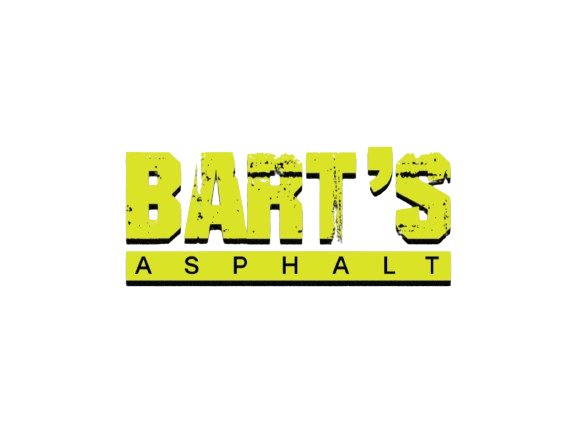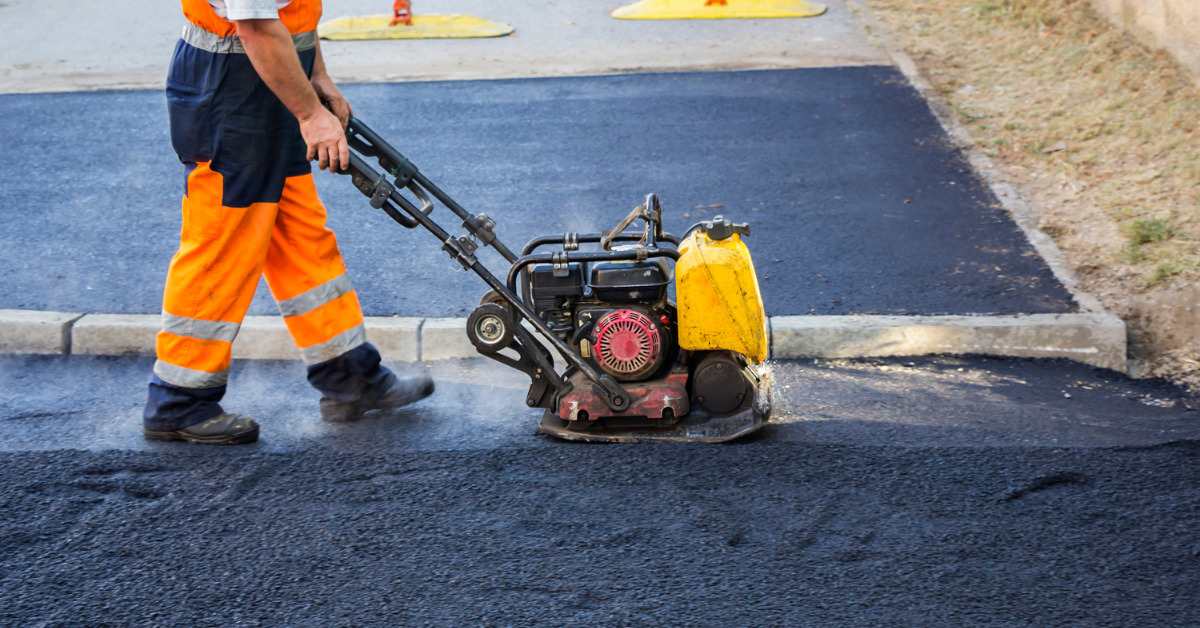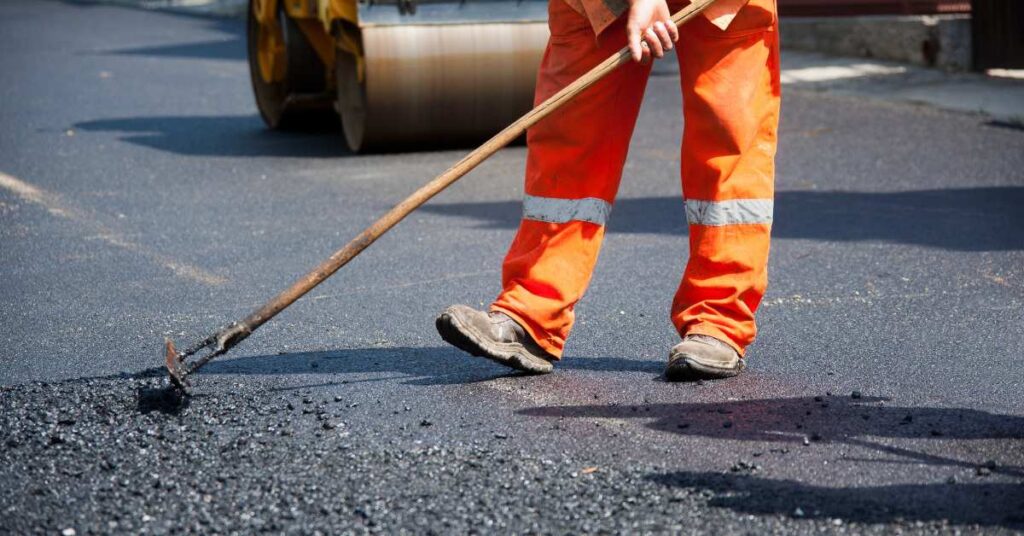Have you ever thought about what maintains the condition of roads and parking lots over time? The answer is asphalt paving. This process involves mixing sand, gravel, and bitumen—a sticky, black substance. The mixture is heated and spread to create the smooth surfaces we use every day. But what is asphalt paving, and why is it commonly used in commercial projects?
In this article, we’ll explain everything about asphalt paving—what it is, how it works, and why it’s a popular choice for businesses, especially in Michigan. Whether you’re a business owner in Ann Arbor, Lansing, or Jackson, Bart’s Asphalt, a local asphalt contractor, ensures your commercial space gets the best paving solutions. Ready to dive in? Let’s begin.
Key Takeaways:
- Asphalt paving is a critical process used to create durable surfaces for residential and commercial applications, including roads and parking lots.
- Asphalt is made from a combination of aggregates like sand, gravel, and bitumen—a sticky, black substance that binds the materials together.
- Bart’s Asphalt is a trusted provider of asphalt paving services in Michigan, specializing in commercial projects across Ann Arbor, Lansing, and Jackson.
- Asphalt offers various benefits such as durability, cost-effectiveness, and eco-friendliness, making it a preferred material for high-traffic areas.
- Understanding the asphalt paving process, maintenance requirements, and selecting the right contractor can significantly extend the lifespan of your paved surfaces.
What Is Asphalt Paving?
Okay, so let’s get into it—what is asphalt paving, really? Simply put, it’s the process of laying down a mix of aggregates (like sand, gravel, and crushed stone) bound together with bitumen. Bitumen is that sticky black substance that holds everything together, giving asphalt its flexibility and durability. This mixture is heated up, spread evenly over the surface, and then compacted to create a strong, smooth pavement.
Why does this matter? Asphalt’s flexibility makes it perfect for commercial areas because it can handle the weight of vehicles and adapt to Michigan’s changing seasons without cracking. It’s used for everything from roads and highways to parking lots and industrial facilities. Plus, with a bit of maintenance, it can last for decades. Curious about how this works in Michigan’s climate? Let’s take a closer look.
Want to learn more? Check out our asphalt paving services to see how we create strong surfaces that last.
The Asphalt Paving Process: Step-by-Step
So, how does asphalt paving actually work? Let me walk you through the process—don’t worry, it’s not as complicated as it sounds.
Site Preparation
First things first, we need a clean slate. The site is cleared of debris, and the ground is graded to ensure proper drainage. This step is crucial because no one wants water pooling on their pavement—especially in Michigan, where rain and snow are common. Proper grading sets the foundation, literally, for everything that comes next.
Creating the Asphalt Mix
Now, here’s where the magic happens. Aggregates like sand and gravel are mixed with hot bitumen. This mix is heated to make it pliable and easy to work with. It’s important to get the temperature just right; too hot or too cold, and it won’t spread or compact properly. At Bart’s Asphalt, we use advanced equipment to ensure the perfect mix every time.
⚡Fun Fact: The temperature of asphalt when paving can be as high as 300°F!
Transporting and Laying the Asphalt
Once the mix is ready, it’s transported to the site while it’s still hot. Specialized paving equipment spreads the asphalt evenly over the surface. This step requires precision—getting the right thickness is key to making sure the pavement lasts. Whether it’s a parking lot or a roadway, the asphalt must be spread and leveled accurately.
Compacting and Finishing
After the asphalt is laid, it’s time for the final touch—compacting. Heavy rollers press down the surface to eliminate air pockets and bond the asphalt to the base layer. This ensures a smooth, dense surface that can handle heavy traffic without crumbling. Once compacted, the surface is inspected for any imperfections, and voilà—your new asphalt surface is ready.
Ready for a smooth, durable surface? Contact Bart’s Asphalt to get a free on-site quote for your commercial project.
And that’s it! The asphalt paving process, simplified. By breaking it down, you can see just how much care and precision goes into creating the surfaces we rely on every day.
Types of Asphalt Used in Commercial Paving
When it comes to commercial projects, not all asphalt is created equal. Different types are suited for different purposes, and knowing the options can help you make the right choice for your business. Let’s break down the main types:
Hot Mix Asphalt (HMA)
This is the most common type, and for good reason—it’s durable and reliable. Hot Mix Asphalt is produced at high temperatures, making it flexible and perfect for heavy traffic areas like roads and large parking lots. It’s a great fit for Michigan’s commercial projects because it holds up well, even through those harsh winter freezes and summer heat waves.
Warm Mix Asphalt (WMA)
Want something more eco-friendly? Warm Mix Asphalt is the way to go. Produced at lower temperatures than HMA, it uses less energy and emits fewer greenhouse gasses. WMA is becoming increasingly popular for businesses that prioritize sustainability. Plus, it can be applied even in cooler weather, making it a versatile option for projects throughout Michigan.
💡Quick Tip: WMA might be the perfect choice if you’re planning a project during Michigan’s shoulder seasons, like early spring or fall.
Cold Mix Asphalt
Cold Mix Asphalt is your go-to for quick fixes, like filling potholes or patching up small areas. It doesn’t require high temperatures, so it’s convenient for immediate repairs. While it’s not as durable as HMA or WMA, it’s a practical short-term solution when you need to keep your commercial space functional until a more permanent fix can be made.
Porous Asphalt
If you’re dealing with stormwater issues or want to improve drainage, porous asphalt is a great choice. It allows water to flow through the surface, reducing runoff and preventing flooding. This is particularly useful for parking lots and commercial spaces where water management is crucial—perfect for businesses in Michigan’s rainy areas.
Need expert advice? Visit our asphalt paving page to explore which type of asphalt is best suited for your commercial project.
By choosing the right type of asphalt, you can maximize the lifespan and performance of your commercial surfaces, ensuring they stay durable and safe for years to come.
Benefits of Asphalt Paving
So, why is asphalt paving such a popular choice for commercial spaces in Michigan? Let’s dive into the benefits that make it the go-to option for businesses in Ann Arbor, Lansing, and Jackson.
Durability and Strength
Asphalt is built to last longer. It’s designed to withstand heavy traffic loads, making it ideal for busy roads, parking lots, and industrial areas. Plus, its flexibility helps it endure Michigan’s freeze-thaw cycles, reducing the risk of cracks and potholes.
Cost-Effectiveness
When it comes to commercial projects, budgets matter. Asphalt is a more affordable option compared to materials like concrete, both in terms of installation and maintenance. Its quicker installation time also means less downtime for your business, which is a huge bonus for high-traffic commercial sites.
Eco-Friendly Options
Asphalt is one of the most recycled materials in the world, and modern techniques like using Warm Mix Asphalt reduce energy use and emissions. Choosing asphalt not only makes sense for your business but also supports sustainability—a win-win!
Smooth and Safe Surface
A smooth asphalt surface isn’t just about aesthetics; it’s about safety, too. Asphalt provides a seamless driving experience, reducing the wear and tear on vehicles and ensuring a safer environment for pedestrians and drivers alike. In commercial settings like shopping centers and office parks, having a well-maintained surface is key.
Looking for a long-lasting solution? Contact Bart’s Asphalt for a competitive estimate.
Common Uses of Asphalt Paving
Asphalt paving is incredibly versatile, making it suitable for a wide range of applications. If you’re in Michigan—whether it’s Ann Arbor, Lansing, or Jackson—you’ve probably come across these common uses:
Roads and Highways
Asphalt is the top choice for roads and highways because of its durability and flexibility. It can handle the heavy traffic loads and fluctuating temperatures that Michigan is known for. Municipalities and businesses alike prefer asphalt for its smooth, reliable surface that stands the test of time.
Parking Lots
Commercial parking lots, whether for office buildings, shopping centers, or industrial facilities, often use asphalt for its durability and ease of maintenance. Its smooth surface makes it easier to clear snow during Michigan’s winter months, which is a must for business owners.
Need a new parking lot? Check out our parking lot paving services to learn more about how we can enhance your space.
Industrial Facilities
In industrial zones where heavy machinery and vehicles are common, asphalt provides the strength needed to handle these demands. It’s ideal for warehouses, distribution centers, and other commercial spaces that require a surface capable of bearing substantial loads.
Airport Runways
Airports use asphalt for runways and taxiways because of its smooth, flexible surface, which can support the weight and speed of aircraft. Asphalt’s quick installation and repair times also minimize downtime—an important factor for busy airports. Learn about our line striping services to keep your commercial areas organized and safe.
The Environmental Impact of Asphalt Paving
As more businesses look for sustainable solutions, you might be wondering how asphalt fits into an eco-friendly plan. The good news? Asphalt can be environmentally friendly when produced and used responsibly. Let’s explore how:
Recyclability of Asphalt
Did you know asphalt is one of the most recycled materials in the world? In fact, recycled asphalt pavement (RAP) can be used to create new surfaces, reducing the need for fresh materials and minimizing waste. By reusing asphalt, businesses in Michigan contribute to a circular economy, reducing their carbon footprint.
⚡Nearly 100 million tons of asphalt are recycled annually in the U.S., making it a top choice for eco-conscious projects.
Warm Mix Asphalt (WMA)
Bart’s Asphalt offers Warm Mix Asphalt, a greener alternative to traditional hot mix. WMA is produced at lower temperatures, which means less energy consumption and reduced emissions. For businesses looking to minimize their environmental impact, WMA is a fantastic option that doesn’t compromise on quality.
Porous Asphalt for Water Management
Porous asphalt is an innovative option that allows water to filter through the pavement, reducing runoff and helping manage stormwater. This is especially useful for parking lots and commercial spaces in Michigan where heavy rainfall can cause flooding. Using porous asphalt supports sustainable drainage practices.
By choosing eco-friendly options and recycling materials, asphalt paving can be a sustainable choice for commercial projects. At Bart’s Asphalt, we’re committed to offering solutions that help protect the environment while meeting the needs of businesses.
How Long Does Asphalt Paving Last?
You’re probably wondering, “How long will my asphalt surface last?” The good news is that, with proper installation and maintenance, asphalt can last anywhere from 15 to 25 years, especially in commercial settings like roads, parking lots, and industrial areas.
Learn more about “How Long Does Asphalt Paving Last” here.
Conclusion
Asphalt paving is an essential component of commercial infrastructure, providing strong, durable, and cost-effective solutions for businesses in Michigan. From roads and parking lots to industrial facilities, asphalt is versatile and long-lasting when installed and maintained correctly. Understanding the types of asphalt, the paving process, and the benefits can help you make the best decision for your commercial projects in Ann Arbor, Lansing, or Jackson. For reliable, high-quality results, trust Bart’s Asphalt to deliver exceptional service and expertise for all your paving needs.
If you need to upgrade or install new asphalt surfaces, contact Bart’s Asphalt today or call us at 517-888-3208. Trust Bart’s Asphalt for all your asphalt paving needs in Michigan.
Frequently Asked Questions About Asphalt Paving
Is asphalt better than concrete?
Asphalt is often preferred over concrete for commercial projects due to its cost-effectiveness, quicker installation, and flexibility. Asphalt can withstand varying temperatures and heavy traffic, making it a suitable option for Michigan’s roads and parking lots. Plus, it’s easier and cheaper to repair.
What is the difference between asphalt and blacktop?
Asphalt and blacktop are similar, but they have different compositions and uses. Asphalt is used for large commercial projects, such as roads and highways, while blacktop is typically reserved for smaller residential surfaces like driveways. Blacktop has more stone, giving it a rougher texture.
Can you pave over old asphalt?
Yes, paving over existing asphalt—known as an overlay—is possible if the underlying surface is stable and not severely damaged. Bart’s Asphalt provides professional assessments and overlay services to restore your pavement efficiently. Learn more about our asphalt repair services to see how we can enhance your existing surfaces.
Can you put asphalt over cracked concrete?
Yes, asphalt can be applied over cracked concrete as long as the concrete is structurally sound. We recommend addressing any cracks beforehand to ensure the new asphalt surface remains durable and smooth.
How long will an asphalt overlay last?
With proper maintenance, an asphalt overlay can last up to 15 years. Routine sealcoating, crack filling, and timely repairs are key to maximizing its lifespan. Extend the life of your commercial asphalt by exploring our sealcoating services.
If you have more questions or need advice on your commercial project, feel free to contact Bart’s Asphalt. We’re here to help.


